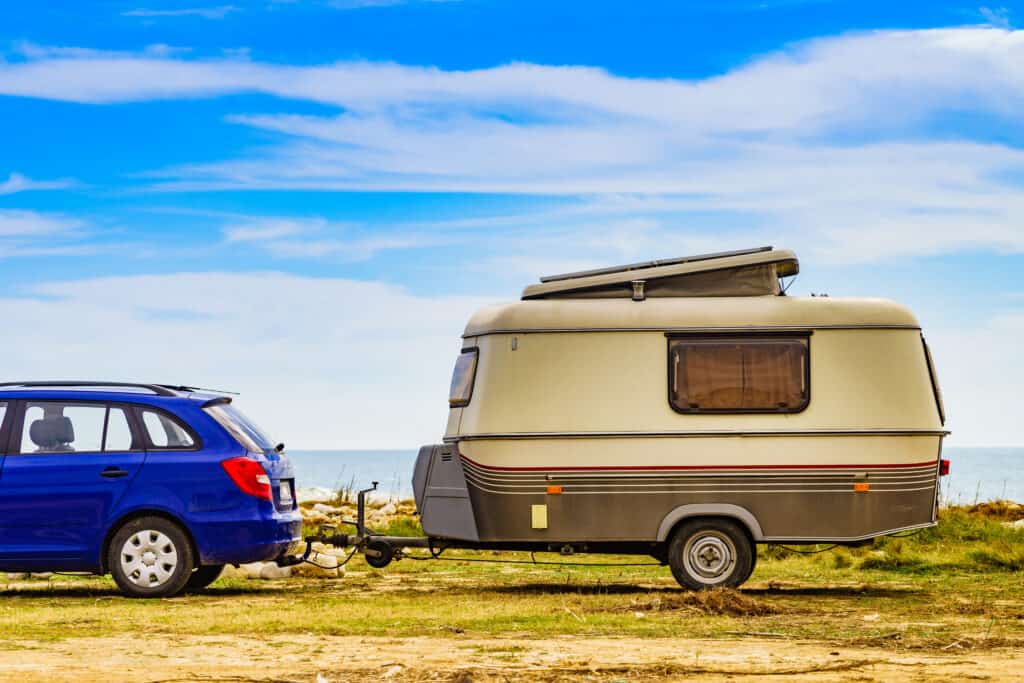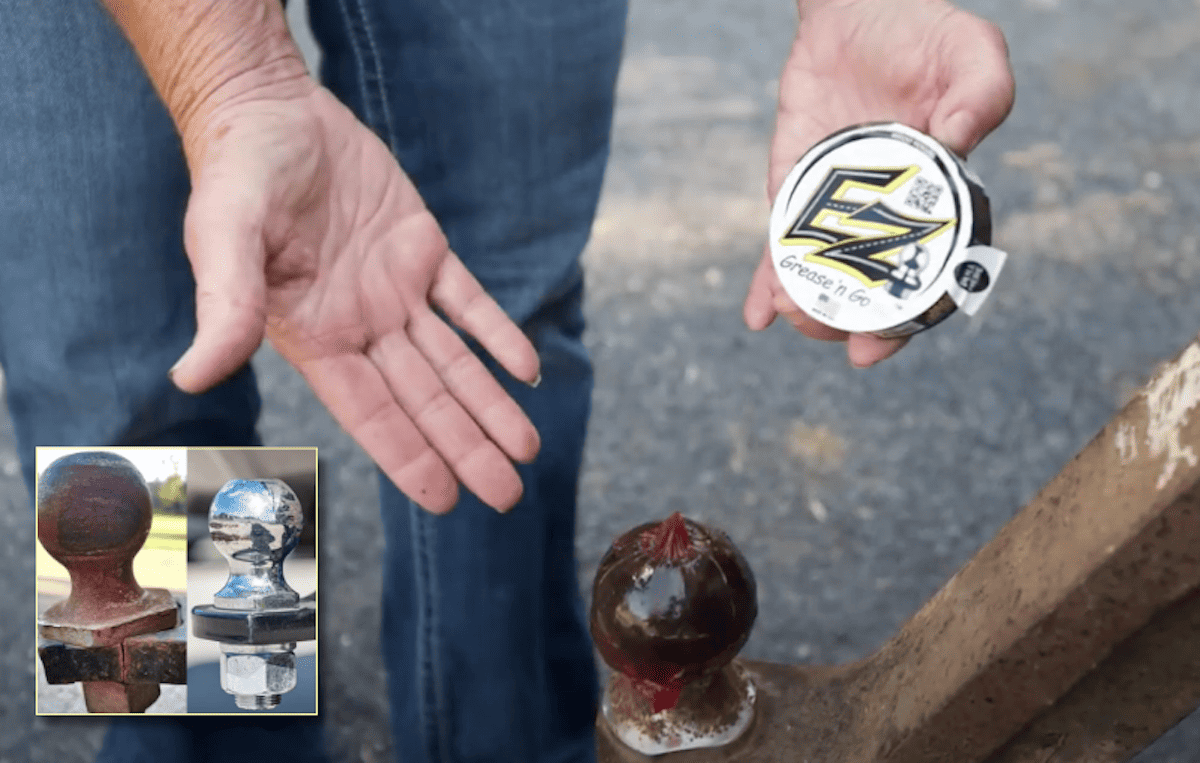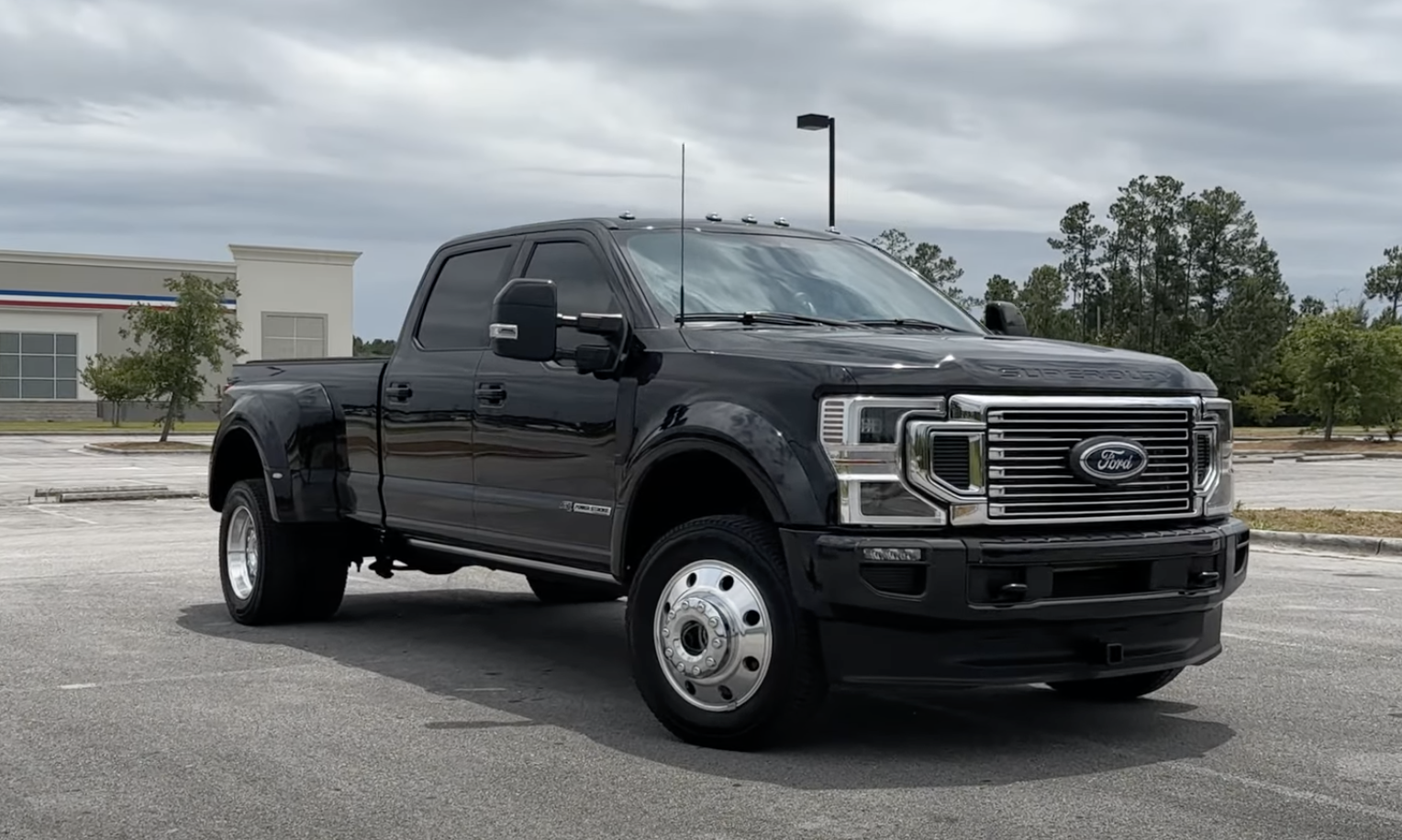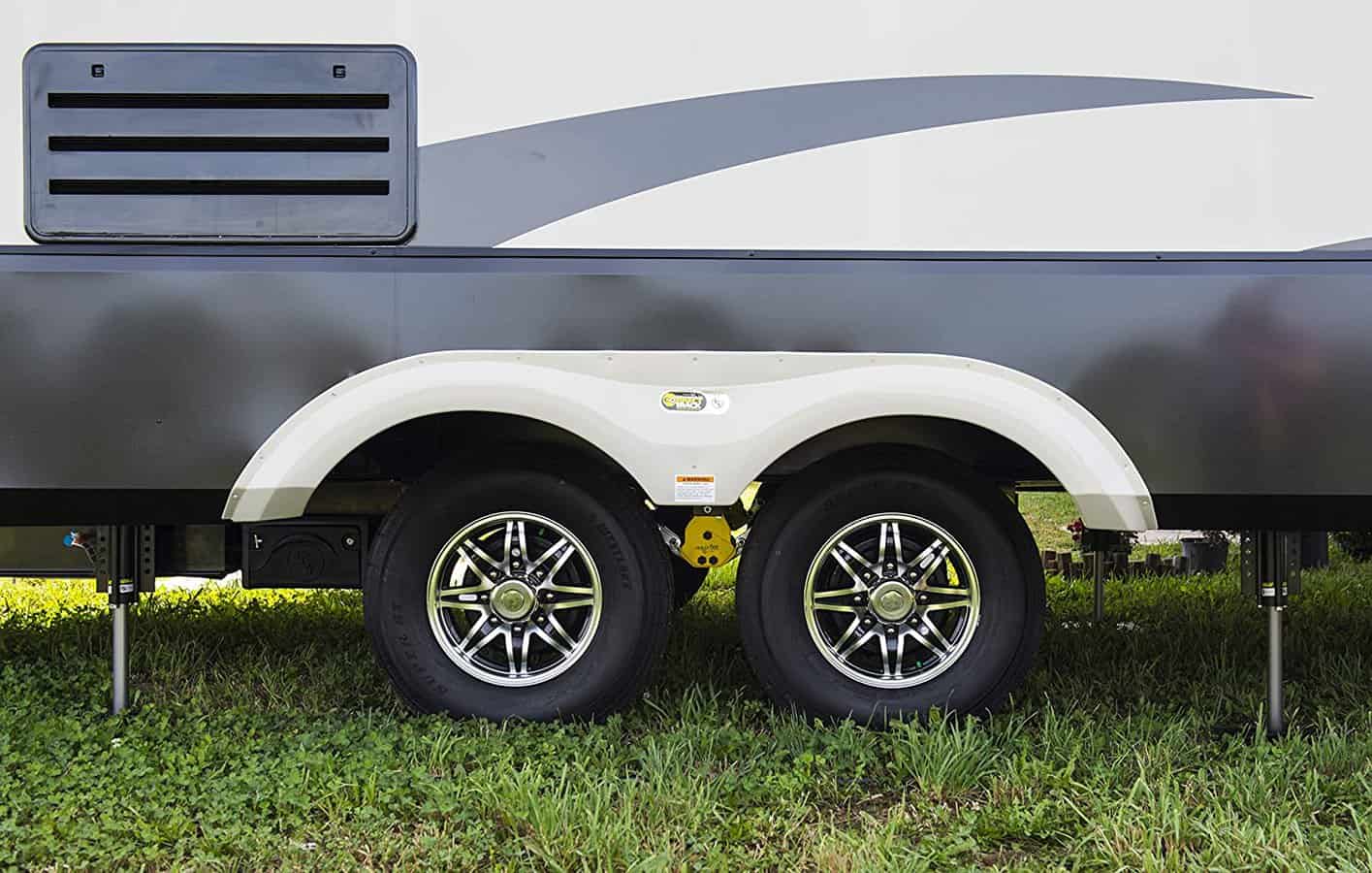
Small trailer towing can be trickier than pulling a bigger one. If you are having challenges, these 17 small trailer towing tips can teach you how to make it easier.
The Best Small Trailer Towing Tips for RVers
If you often travel with just your immediate family or a few friendly passengers, then a small camper trailer is all you need. Now, it’s important that I define what a “small” camper trailer is for the sake of this article, because there are some trailers out there that are only 10 feet wide! I’m talking more about 40-foot campers, which are still small, but give you room to move around and breathe. (And hey, if you can make a 10-foot camper work for you, then more power to ya!)
Many campers with such a short stature are teardrop-shaped. This means they’re more curved than angular to give off the illusion of more space. Towing these can be a different experience than what you’re used to, especially if this is your first camper trailer. You do get more leeway in the vehicle you use to tow, such as SUVs or lighter-weight pickup trucks. That said, you will soon find that hauling a smaller camper brings on a whole host of new responsibilities.
1. Choose a Smaller Towing Vehicle
Remember how in the intro, I said you get more leeway when it comes to choosing which vehicle can tow your small camper? That is true, but you have to use common sense, too. There’s no need to get a heavy-duty SUV or large pickup truck that’s several thousand pounds to pull a camper of this size. It’s completely unnecessary.
To determine the best vehicle for the job, you want to start by calculating the following:
- The Gross Combination Weight Rating or GCWR (the weight of the vehicle added to the full trailer weight)
- The Gross Vehicle Weight Rating or GVWR (fuel, passengers, equipment, cargo, and anything else you bring on your road trips all totaled together)
Once you have those numbers, you can determine the Maximum Tow Rating.
If you do have one of those super-tiny teardrop-shaped trailers that’s 10 feet and at least 290 pounds, then you can even tow your camper with a motorcycle! Yes, it’s true. The motorcycle must have an engine that’s at least 1,000ccs to make it happen.
If you have a larger trailer, such as one that’s 450 pounds and a motorcycle at 1,300 ccs, you can still tow your camper with a motorcycle. How cool is that?
Note: To make safe turns and keep the motorcycle stabilized, it’s recommended you get a swivel hitch.
2. Position Cargo Weight Towards the Camper’s Front
Positioning items in your camper is like a game of Tetris. You have to carefully place everything so there’s balance throughout. Otherwise, you could tip your trailer on the front or rear axle. You won’t be able to tow the camper until you rectify this issue.
Small camper trailer owners recommend pushing most of the cargo weight to the front. How much is “most?” About 60 percent is ideal. You should be careful not to exceed a 40 percent cargo limit in the back as well. Doing so leads to a tail-heavy trailer that can swing unpredictably as you drive. Some camper trailer owners liken this to a dog wagging its tail. The camper is all over the place and difficult to control.
3. Bring Less
Your camper is small and lightweight, so naturally, you cannot bring as much gear as you would if you were taking a trip in an RV. You’re going to have to be accommodating to make everything work. That means limiting the clothing you take with you and keeping the passenger count low.
It can be tempting to stock up on food and water before you go so you won’t have to stop for a while. Simply put, you just don’t have the room. Food takes up a lot of that room. Water is a space-hog, too. More concerningly, though, it weighs a lot. In fact, a gallon of water may weigh eight pounds or more if you get those huge jugs. How many of those do you realistically think you can fit on your camper?
Maybe one. If you’re devoting yourself to small camper ownership, be prepared to make more stops more often. It’s a minor inconvenience, yes, but your trailer simply can’t handle anything more.
4. Get Used to a Going at a Slower Pace
Towing can be scary if you’ve never done it. That’s the case whether you’re tugging a tiny camper or a bigger one that’s several thousand pounds. You now have to account for this extra hunk of metal behind you, and that means you have to change the way you drive.
One of the principle ways of doing so that many camper trailer owners recommend is going slow. This may seem like common sense, but I mean going slow at almost all times. You should drive at maybe 40 miles per hour. While this might seem ridiculous, it’s really for your own safety, those of your passengers, and fellow motorists.
When you’ll pulling hundreds or thousands of extra pounds, it becomes more difficult to do even the most basic driving maneuvers. These include stopping, turning, and accelerating. You need to be in control of your vehicle at all times, whether you’re towing a camper trailer or not. By keeping a reliable, even driving pace, you should find it easier to turn and put on the brakes if necessary. You can even speed up if you ever have to.
You’re probably wondering, “what do I do if I’m driving on a highway? I can’t get away with going 40 MPH.” That’s true, you can’t. You can accelerate when doing highway or freeway driving, but don’t try to push your setup too much faster than 40 MPH. If you have to make a sudden stop, it could be nearly impossible to brake at the exact moment you want to. That could lead to an unnecessary accident.
As a rule of thumb, you certainly always want to be within the recommended speed limit. If you’re driving a little slower than that speed limit, that’s okay. Other drivers might be annoyed with you, but most won’t be. After all, they can plainly see that you’re towing a trailer, so they might give you more space.
5. Know the Road Before You Go
You want to do the best you can to avoid sudden stops and turns. These maneuvers probably make you nervous at this point, which is understandable.
While there’s no way to predict other motorists’ behavior with 100 percent accuracy, you can feel more confident if you can predict your own. Before you set out on your trip, look at the route. It’s so easy to do that with apps like Google Maps, which come with an iPhone. If you don’t have an iPhone, there are tons of other map apps out there to use.
Are there four-lane highways? Overpasses and tunnels? Road circles and other tight turns? These are all things you have to worry about. On four-lane highways, other drivers sometimes get antsy and want to make sudden lane changes. You’ll have to have your foot hovering over the brake to be safe.
Your truck/SUV and your camper should be able to fit through most overpasses and tunnels without issue. Instead of guessing if you can get in, though, know the clearance of your vehicle before you hop into the driver’s seat. Circles and tight turns can be a challenge for first-time camper trailer owners getting used to towing. If you can avoid these, then do your best to.
6. Park Carefully and Conscientiously
Speaking of being safe and conscientious, at some point, you’re going to park your vehicle and your camper trailer. You might have to refuel your truck, take a bathroom break, buy food and water, or arrange for some lodging. Regardless, you need to find a parking spot.
Now, you normally have no problem squeezing your pickup truck or SUV into the average parking spot, but today you have a small camper trailer attached to your vehicle. How do you go about parking?
You’re going to have to take your time and make sure you have adequate space. With your setup, you’re going to take up two spaces, ideally ones that are arranged vertically. There’s no other way around it. Your truck or SUV will cover one space and your trailer the other.
You must make sure you have adequate room to park. Do not try to fit your setup into a single parking space. It will not end well. If you can help it, don’t park at angles, diagonally, or horizontally (in most parking lots). You’re hogging up too much room and preventing other motorists from getting a parking spot themselves.
If you find two spots but they’re surrounded by other vehicles, you have to make a judgment call. Can you maneuver into the spot or is it too tight? If you don’t feel comfortable with the parking spaces available, you’ll have to seek alternate parking. It’s a bit of an inconvenience, but something you may have to learn to live with when towing a camper trailer.
Parking garages are not your friend, by the way. These are often too narrow, and you might not have adequate clearance. Don’t get yourself literally stuck in a situation you can’t get out of.
7. Back up Slowly and Carefully to Avoid Jackknifing
Okay, so you’ve found your parking spot, you’ve done your thing, and you’re ready to leave. Now comes the tricky part. You need to back up to get out of the parking spot (unless you can just drive through the lot based on the way you parked, which is great if you can!).
Once again, you need to take things slow. I might sound like a broken record, but it’s important that you take your time when pulling out of a parking spot. There’s a risk of what’s known as jackknifing. When this happens, your camper trailer will get away from you. It will slide out at a sharp angle that is not conducive to safe driving. You might feel like your trailer is now shoving you as you lose control of your vehicle. In other words, it’s not fun at all.
Not only is jackknifing a horrifying experience, but if it happens to you and you hit another motorist or parked car, you’re in the wrong. So yes, as you back out of parking spaces, go slower than usual. It may feel silly at first, but you’re doing your best to be safe, and that’s what matters.
8. Gauge What’s Coming Ahead
It’s probably really starting to sink in now that you can’t just stop your truck and camper on a dime. Besides taking it nice and slow and looking at your route ahead of time, what else can you do?
There’s a trick that motorhome enthusiasts follow as they acclimate to life on the road. They get into the habit of assuming traffic patterns on a 15-second basis in front of them. If a vehicle three cars ahead has their turn signal on, an RV owner might predict that this driver will cut into a different lane. If someone is riding their brakes, the RV owner might assume this motorist is going to pull off onto an exit or even onto the road’s shoulder.
This is a skill you will naturally pick up the more you tow your camper trailer. With time, you want to cut it down to 12 seconds or even 10 seconds if you can (but admittedly, this may take years of experience).
You’re no psychic, of course, and as I said earlier, it’s very hard to guess how other drivers will behave. This skill will prevent the sudden need for braking, though. If you can assume what will happen several seconds before it does, that gives you adequate time to react. By the time you pump the brakes, your vehicle might come to a stop just in time.
9. Use Turn Signals Early and Often
Speaking of stopping in time, how many times have you experienced the following scenario? You’re driving without a trailer in a three or four-lane highway. Out of nowhere, the driver in front of you slows down so they can cut lanes. They almost cause you to crash into them. There’s no turn signals used, and you curse them under your breath.
This has probably happened a handful of times in your years of driving, right? There are some drivers out there who are just inconsiderate and seem to forget their turn signals exist. That can’t be you. You’re not just in a truck or SUV anymore. Even though your camper is tiny, it’s still taking up considerable room on the road. If you need to make a turn, switch lanes, or do any other maneuver, you must have your turn signals on.
These let other drivers know you’re coming their way. They can then make some room for you. They’ll also appreciate the early notice since they won’t have to slam on their own brakes. Just, you know, don’t turn on your signals too early, because then the other drivers will have no idea when you’re going to turn.
10. You Might Have to Change Your Mirrors
This came up with my piece on towing a fifth-wheel trailer, but it’s worth mentioning again. Many first-time camper trailer owners decide to get new mirrors to aide them in their driving. After all, the standard mirrors that come with your truck or SUV are not often adequate for camper towing. You won’t be able to see the whole camper behind you. Having such a huge blind spot puts you at a higher risk of accidents.
Extended side-view mirrors are a common choice for RV and camper trailer enthusiasts alike. You can either get these permanently installed or get clip-on versions. If you do get clip-ons, you can take them off when not towing. That’s pretty convenient.
You also might want to look into rear-vision cameras. These will include a driver cockpit monitor that lets you see everything to the rear of your trailer. While these additions are expensive, they’re worth considering, especially if you’re apprehensive about making lane changes, turns, and other maneuvers.
11. Gettin’ Hitched: Here’s How
If you read that blog post about fifth-wheel trailers, then you know that that type of trailer uses a fifth-wheel hitch. What about camper trailers? Can you use the same type of hitch? Unfortunately, you can’t.
Instead, you might use any of these other hitches:
- Weight distribution hitches: If you have a pickup truck, a weight distribution hitch is ideal. This connects via the truck’s rear hitch. You never have to worry about too much or too little tongue weight with one of these bad boys. Although they look a little funny, with long metal prongs and chains protruding out of each one, those prongs or spring rods keep the hitch weight balanced.
- Bumper hitches: Bumper hitches connect to a truck or SUV’s bumper, making them a versatile choice. They are often made of durable rubber or metal. These hitches have a square-shaped receiver tube that’s compatible with plenty of hitch setups. Since bumper hitches are designed for lightweight towing, your small camper trailer fits the bill perfectly.
- Pintle hitch: Pintle hitches don’t look like your standard hitch. That’s because they have a lunette, or a ring-like metal part, and a pintle that kind of looks like an oversized metal wrench. Don’t knock it until you try it. Pintle hitches can pull trailers that are up to 60,000 pounds. It is worth noting that they’re not very quiet, though.
- Gooseneck hitch: The closest you’ll find to a fifth-wheel hitch is a gooseneck hitch. These connect to the rear axle of your pickup truck, opening up the truck’s bed. That gives you even more room for carrying gear and other essentials.
- Rear receiver hitch: Above all the other hitch types, you’ll probably come across rear receiver hitches the most frequently. This might even be the hitch you choose. They connect to the vehicle’s rear. Like the bumper hitch, they’re also designed with a square receiver tube. Rear receiver hitches are arranged by weight class, with five classes total.
12. Make Sure You’re Legal
What do I mean by being legal? It turns out that if your truck/SUV and camper trailer weigh at least 1,000 pounds (and sometimes up to 1,500 pounds), you might have to get a braking system installed for the trailer. This is state-mandated, but not in every single state. Still, if you plan on doing cross-country driving, you should look into getting this second set of brakes. You don’t want to get fined or worse for not having them!
13. Keep the Camper as Empty as Possible During Towing
When you’re camped out for the night, you or a few other passengers might sleep in your camper trailer. There’s room enough, after all. The rest of you might unfurl sleeping bags, pitch a tent, and spend the night out in nature.
What about when the trailer is in motion? Can your passengers hang around inside then? Absolutely not. There’s a few reasons for this. First, it might not be legal (going back to Tip 12). Second, it’s not safe. There probably aren’t seatbelts available in your trailer, so if you were to hit something, or someone were to hit you, you can’t know for certain if your passengers would survive. That’s grim, I know, but you have to think in those terms.
The last reason has to do with the weight distribution of your trailer and your truck or SUV. Remember how we likened balancing the weight in your towing setup like a game of Tetris? What happens when you stack all the Tetris pieces in one corner? The balance is gone. Your trailer then becomes unstable.
14. Monitor Battery Life
RVs and campers are powered by batteries. I wrote a detailed guide about finding, using, and powering your batteries that you can read here. It’s aimed at camper trailer owners like you, so keep it handy.
Like any battery, the one in your trailer will not last forever. You must be diligent about testing its charge and recharging it when necessary. Remember that climate plays a big role in the longevity of your battery. You can also help your battery lifespan by taking it out when your camper is not in use.
15. Empty Your Tanks
If you thought buying a camper trailer was pricy, wait until you gas up your truck or SUV. Even if your vehicle has good gas mileage, once you attach a trailer to it, that mileage tends to go down.
That doesn’t mean you have to grin and bear it each time you gas up. Here’s a handy little hack you can do to pay less at the pump: look at your tanks! I’m referring to the freshwater, blackwater, and graywater holding tanks. The freshwater tanks provide the potable water you use for bathing, cooking, and drinking. Blackwater and graywater tanks hold the waste that a camper eventually accumulates with humans living aboard.
If you empty these ahead of your journey, you’re lessening the weight on your trailer. If you’re allowed to at certain campsites and other stops, you can dump these tanks again. The weight that can accumulate in the tanks is significant enough that you should see a decent reduction in how much you pay for gas.
16. Use Safety Chains
If you want to make sure your hitches won’t go anywhere, you should invest in a set of safety chains. For the best stability, place these so they criss-cross over one another in an X. This way, when a situation arises where the hitch might pop off, you’re covered. The chains will catch the tongue hitch, saving you a costly replacement.
17. Do a Safety Walk Through
You’re driving a new setup for the first time, so it’s going to take a bit of getting used to. Whether you print out this article or make a personalized checklist for your own small camper trailer, there are several areas you should always look over. These include the tires, the towing connections, and the mirrors. You might want to take breaks on a 50-mile basis of your journey just to look at everything and make sure you’re in the clear.
Once you have that first trip under your belt, there’s no need to be so frequent with your stops (unless you feel more comfortable that way). You might want to stretch out your checks to 100 miles and then maybe just to when you start driving each day. Whatever works for you, make sure you do it regularly.
Conclusion
With these 17 small trailer towing tips, you should have everything you need to get your towing setup right the first time. Just because small trailer is little doesn’t mean it isn’t a significant addition when towing. If you’re using a pickup truck or SUV to tow a camper trailer, you’re going to have to relearn the rules of the road. Learn them, and have fun out there!




#12 needs some work. Your numbers are way off. Your truck/SUV alone is going to be double or triple the 1000 pound mark. Did you mean if your vehicle and trailer combined are over 10,000? At least for Georgia, if your trailer is 3,000 pounds or more than 40% of the tow vehicle weight you need trailer brakes.
*my 1/2 tonne truck says I can tow 12,000 lbs! *
You ever try and stop 12,000lbs behind your truck at highway speed? You will be dead.
I am so happy that I found this article. This was the topic that I need to learn.
Nice reading. Well written article. Thanks for this.
I love all the information that I have learned today. Very useful and can be very helpful.
Thank you great information
My husband and I are getting a small RV for vacationing this fall, and I would have thought that we’d need a heavy-duty SUV or pickup, as you mentioned, but it’s good to know that a smaller car is perfectly capable of pulling it. We’ll be sure to check the Gross Combination Weight Rating, as you said, on all of our vehicles and the GVWR of our stuff and trailer combined. Only taking along one jug of water to refill is a good idea, as well, to reduce overall weight and we’ll be sure to try that out.
This site is very helpful and very informative this will help a lot of people
Perfect guide for those who just bought their first camper. Share this article with whoever you know that might even be interested in getting a camper.
Great article for new campers! Thanks